Best companion plants for potatoes: herbs, flowers and veg to improve your potato crop
Choosing the best companion plants for potatoes is easy and will reward you with a bigger, healthier harvest
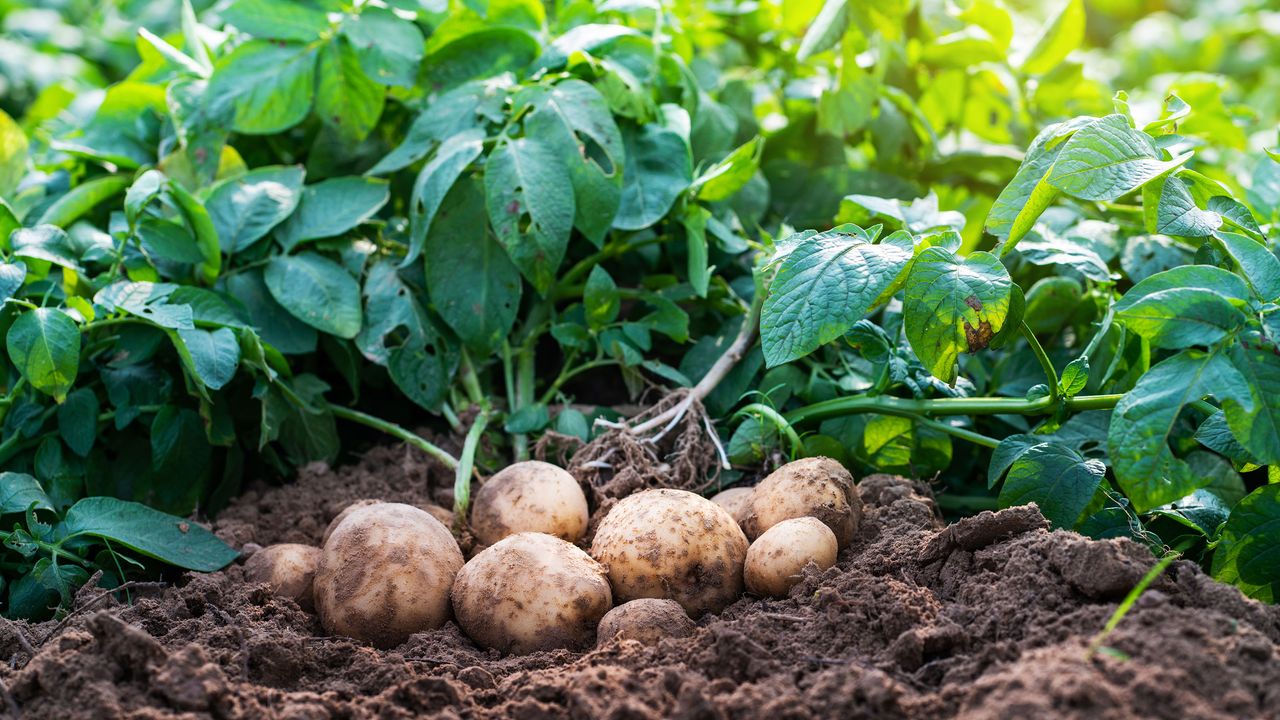
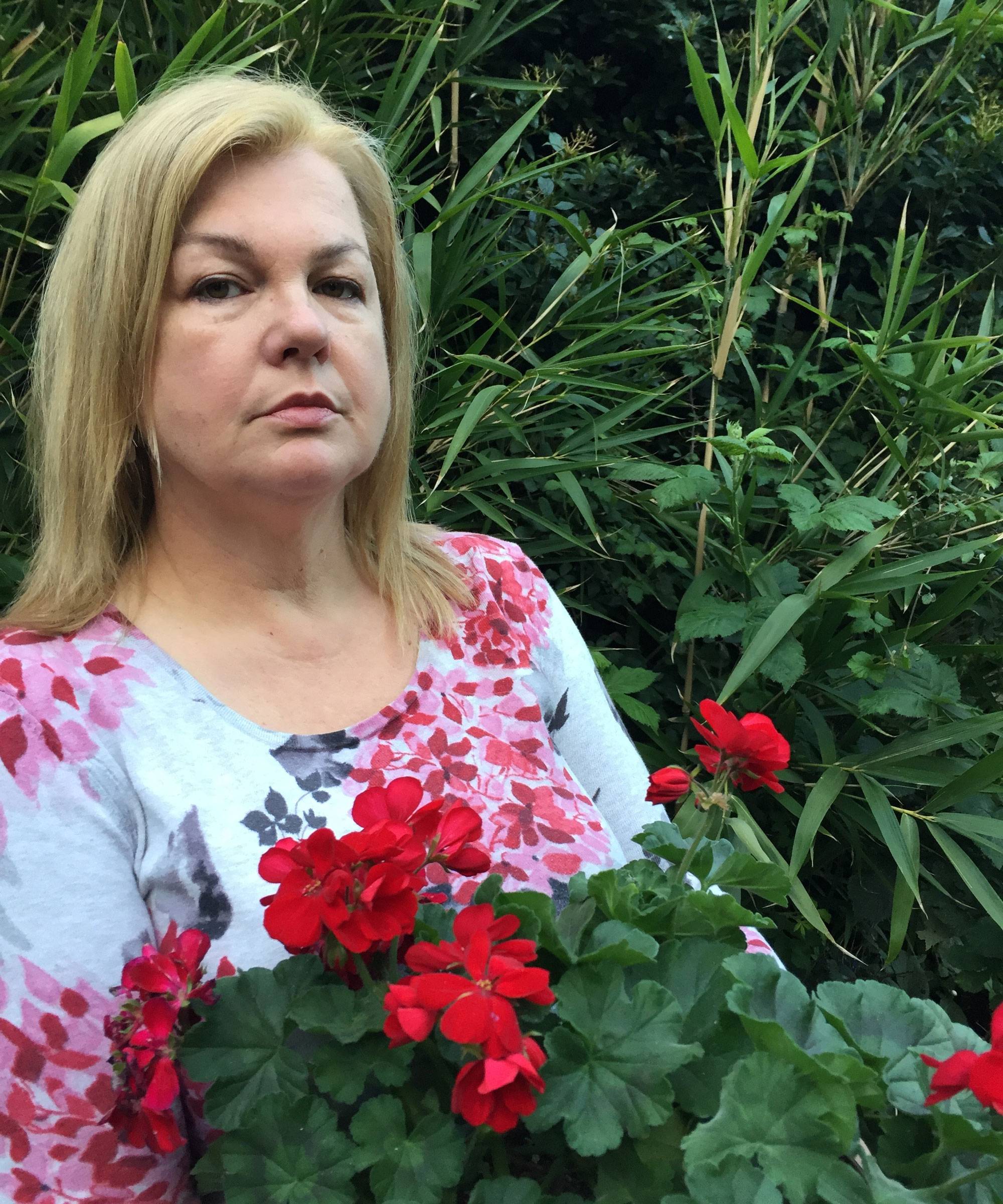
Choosing the best companion plants for potatoes creates a healthier growing environment for your veg plot. Companion planting helps reduce the chances of pests affecting your potatoes which means you end up with a better crop.
It's long been thought that some plants seem to grow better when planted near certain others. Now research shows it's not an old gardener's tale after all and that companion planting can improve the ecosystem in your veg patch, making grow-your-own endeavours much more productive.
Mixing flowers in amongst your vegetables attracts pollinators, while some scented plants and herbs like lavender, garlic and chives even have insect-repellent properties to keep undesirable bugs away. Not all plants make good companions though as some varieties (like potatoes and onions) do not get along well together.
If you're learning how to grow potatoes, you'll want to make sure you know the best companion plants for them. That way, you can start mixing them into your beds to up your growing game and boost your harvest.
Why should you use companion plants for potatoes?
The idea is simple: you plant your potato crop next to a selection of herbs, flowers and vegetables that are known to benefit them as they grow.
Similarly to companion plants for tomatoes, the best companion plants for potatoes deter pests that would otherwise attack the young potato plants, improve soil nutrients to give growing tubers a boost, help to increase the crop, or act as a magnet to pollinators such as bees and butterflies. Companion planting supports plant diversity that is beneficial to the soil and the ecosystem. Plant diversity means insect diversity and this helps to decrease the number of parasites in your garden.
Companion planting for potatoes can also act to create a better growing environment. They provide beneficial shade if required, ground cover to keep weeds at bay and help to break up the soil. Find out what potatoes prefer to be planted next to and you can give your crop a head start.
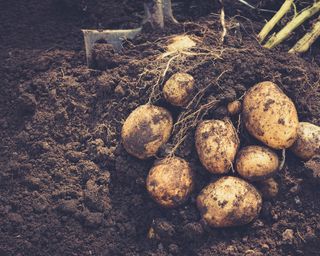
Best herb companion plants for potatoes
These easy herbs work well planted in amongst your potato crop. They improve their growth and flavor, while also attracting beneficial insects to the garden. If you like the idea of growing more herbs, why not learn how to create a herb garden too?
1. Basil
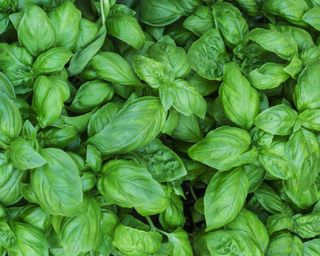
Basil is one of the best companion plants for potatoes because it attracts butterflies and repels bugs like aphids, beetles and white flies. It is also thought to enhance the flavor and welcome beneficial insects. For these reasons, it makes a useful pick if you're after companion plants for strawberries, too.
You can learn how to grow basil with our useful guide.
2. Chamomile
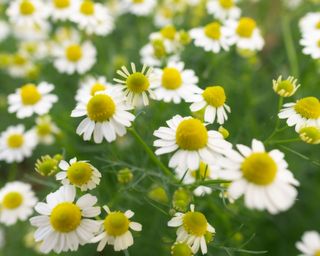
Chamomile is often recommended as a companion plant in the vegetable garden as its strong scent keeps pests away and welcomes beneficial insects. In addition, it's thought to enhance the flavor of potatoes. So, as well as being pretty to look at, it's useful too.
If you want to find out how to grow your own herbal tea, chamomile is a great place to start. The mild, apple flavor of chamomile tea comes from the daisy-like flowers which can be used either fresh or dried to make a refreshing brew.
3. Parsley
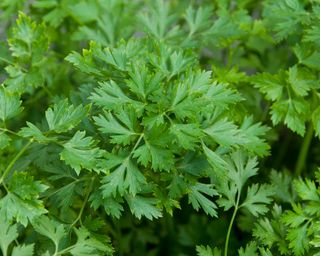
This fragrant herb is believed to be a good companion plant for potatoes as it improves the flavor of the tubers, while also attracting beneficial insects such as hoverflies.
Our guide will teach you how to grow parsley – remember you can move containers of parsley near your potato plants to attract beneficial insects if you don't have space to plant it in the ground.
4. Sage
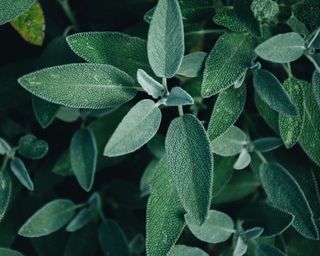
When picking out your companion plants for potatoes, don't overlook the potential of sage as a growth stimulator. It's also a natural form of pest control (it helps keep flea beetles away from your potato plants) and can be used as a way of attracting pollinators.
Flea beetles feed on the leaves of potato plants, making rounded holes. The damaged areas then dry and go brown. Planting sage near your crop will help you avoid this.
5. Thyme
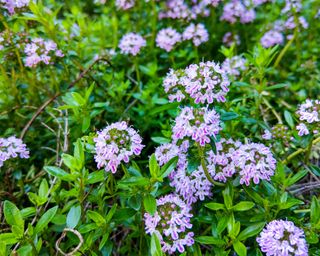
Thyme is also thought to repel flea beetles. It makes a good companion as it's one of the great bee friendly plants too – they love its fragrant flowers. In fact, it's a magnet for all pollinating insects.
What's more, thyme helps to improve the flavor of your potatoes. It's one of the simplest herbs to propagate, so you can easily spread it around amongst your potato crop.
Our dedicated guide on how to grow thyme has plenty of tips to help you get started.
Best flower companion plants for potatoes
Lots of flowering plants make great companion planting for potatoes, helping to attract beneficial insects to the plants. There are several plants thought to enhance the flavor of your harvest, too.
1. Petunias
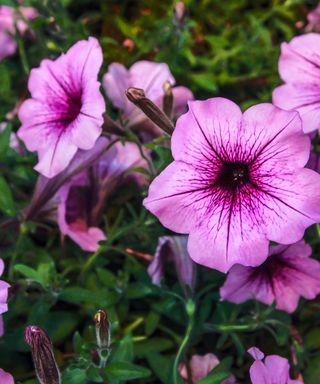
Petunias are useful in repelling many garden pests including aphids, leafhoppers and beetles. They flower for months on end so are a great choice for companion planting. Want to give them a go? Our advice on how to grow petunias is simple to follow and will help you fill your garden with color, too.
They may also protect potatoes from certain pests by confusing them with their strong fragrance. The insects can't find the crop they want to hone in on as the strong scent of the petunias sends them off course.
2. Alyssum
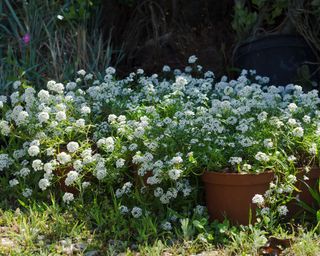
Alyssum is the perfect little flower to tuck into your raised garden bed ideas as a companion plant for potatoes, and you can also grow it beneath taller vegetables or among herbs. It's known for attracting wasps and other beneficial insects that will rid your garden of bad bugs.
Alyssum is also a great plant to grow with potatoes as it's one of the best ground cover plants to stop weeds from growing. It looks pretty, spreads quickly and is easy to keep blooming with a liquid feed.
3. Marigolds
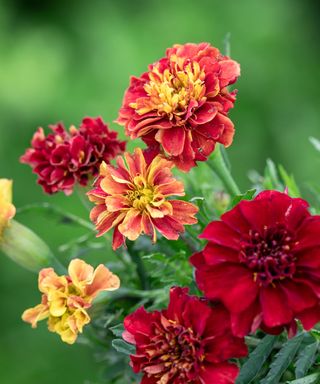
Marigold is an old favorite when it comes to keeping pests away from plants due to its strong scent. Find out how to grow marigolds and you can use them to deter bugs away from potato plants and also protect them from viral and bacterial diseases.
Eel worm is a serious cause of damage to potato crops. A type of nematode, eel worms are repelled by marigolds, especially the tagetes variety. These are available as tall African marigolds (Tagetes erecta) and dwarf French marigolds (Tagetes patella).
Chemical secretions from the roots of marigolds will kill nematodes that, if left to their own devices, will reduce the size, quantity and quality of your potato crop.
4. Nasturtium
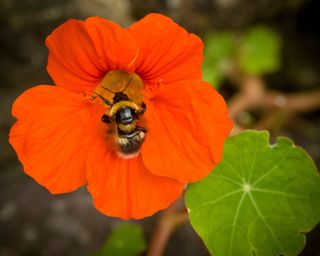
Planted around potato plants, nasturtium helps to deter potato beetles. Nasturtium flowers can also be used as 'trap plants' for aphids, to tempt them away from your crop.
As well as adding brilliant color to the garden, they also make excellent companion plants for tomatoes and cucumbers. You can find more companion plants for cucumbers as well as tips on how to get rid of aphids in our features.
Best vegetable companion plants for potatoes
Plant these veggies and you'll be rewarded with a larger, healthier, and more diverse crop come harvest time.
1. Cabbages
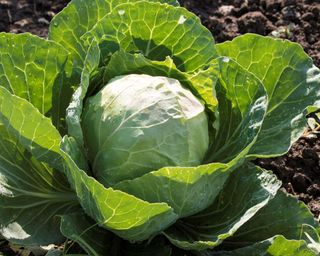
Among the best companion plants for potatoes are those in the cabbage family, and that includes broccoli, cauliflower and kale too. They will happily grow alongside, as cabbage plants all have shallow root systems, so they don't go into competition with potatoes which are deep-rooted.
Our feature on how to grow cabbages will get you choosing the perfect leafy partner for your potatoes in no time.
2. Sweet corn
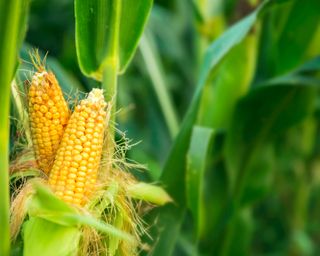
Corn grown as a companion plant for potatoes is believed to improve the flavor of the tubers and also make them grow better. It's a tall crop that doesn't take up too much space in the vegetable patch so it's a good choice if your plot is a little on the small side.
The relatively long growing season needed to produce decent sweet corn makes it an ideal companion for potatoes. Learn how to grow sweet corn between rows of potatoes as protection from the wind and sun.
3. Beans
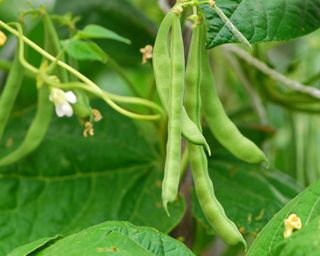
Beans and other members of the legume family are good potato companion plants as they release nitrogen into the soil. This helps to improve the amount of potatoes you get and also improves the quality of the crop.
Green beans also deter potato beetles. In return, potato plants deter the Mexican beetle from eating the green beans – so it's a win-win.
4. Horseradish
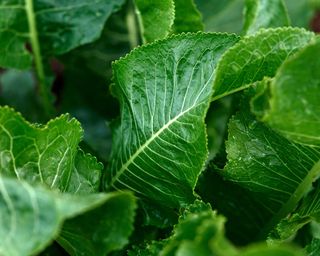
While potatoes do not generally like to compete with other root crops, horseradish is actually considered an excellent companion plant for potatoes. Because it's a natural pest and disease repellent, horseradish will give your potato crop a boost, as well as lending a helping hand with soil pH.
Understanding the make-up of the soil in your garden can be a technical business. Our guide to soil types has lots of advice should you need it.
What not to plant with potatoes
Although potatoes are happy to team up with lots of other crops, there are some that they just don't get along with.
These are the vegetables and flowers that you should avoid planting near potatoes because they compete for space, light, water, and soil nutrients, or they attract insects that are detrimental. So, when choosing your companion plants for potatoes, don't opt for the following:
- Potatoes are part of the same nightshade plant family as tomatoes and capiscum (peppers), so these aren't good planting companions for them. They will compete for the same nutrients if planted side by side. Plus, pests and diseases will also spread between them easily, so they should be kept well apart.
- Carrots, asparagus, fennel, turnips and onions can stunt the growth and development of potatoes.
- Raspberries, cucumber, squash and pumpkin increase the likelihood of potato blight.
- Sunflowers do not make happy planting companions for potatoes as they excrete chemicals that can inhibit germination and stunt the growth of crops grown close by. To avoid small, misshapen potatoes, keep them away from the tubers.

Lifestyle journalist Sarah Wilson has been writing about gardens since 2015. She's written for Gardeningetc.com, Livingetc, Homes & Gardens, Easy Gardens and Modern Gardens magazines. Having studied introductory garden and landscape design, she is currently putting the skills learned to good use in her own space where the dream is establishing a cutting garden.
